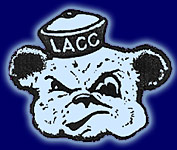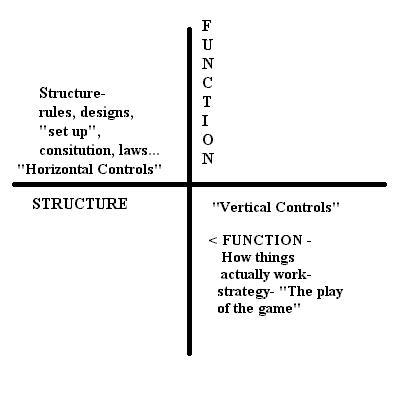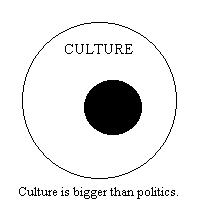Prof. Joe Meyer's LACC Poli. Sci. 1
Week 1

Do all the work you need to do for week 1.
Or DROP THE CLASS NOW!
Terms of interest: |
power | political science |
|---|---|---|
| structure | scientific method | |
| function | government |
Introduction:
What is Political Science?
"This being a world of competing moral principles and conflict among them, absolute good can never be attained. Moral principles can never be fully realized. But at best, must be approximated through the ever temporary balancing of conflicts and the ever precarious settlement of disputes…(thus)…politics is always the choice of the lesser of evils."
Hans Morgenthau , the person who said that, was the father of the School of Realism, one of the many schools of thought in political science.
He's right, politicians don't want to help people. They want power. They might want power so that they can help people, but how are we to know the minds of others?
My discipline, political science, is a unique way of looking at the world. It is a specialized lens through which to view all human behavior and it has a great deal to tell us about ourselves and others.
We don't just study governments. We study all group interaction. We study a simple concept: Power. Political Science seeks to describe explain and predict human behavior in terms of power. Where there are two or more humans there is a power relationship. You have power, I have power, we all do. But is it the same? Do we all use our power in a similar fashion?
The central question of this class is why do we (you and I and most of the rest) have what we have? Not just the stuff, but the mental expecations and vocabulary (freedom, fairness, right, liberty, privacy, profit, etc).
There are many theories to explain the answer to this question, we will explore only a few.
Political Science - one of many Social Sciences.
First, understand that political science is one of the many social sciences. The social sciences have only been developed in the last century or so. And in the last fifty years, the advance in computers has allowed most social science to take place. Computers allow the analysis of huge amounts of data, allowing social scientists to do their job: scientifically describe, explain and predict human behavior.
Political science is a wannabe science like all the other social sciences. Where physics and chemistry get to do lab experiments, we social scientists can only observe institutions and governments as they do experiments (policies). But we follow the basic scientific method . You know the SCIENTIFIC METHOD don't you? If not visit this web site … and then go find your high school science teachers and yell at them. You got ripped off.
Political Science - a wannabe science.
So we use the scientific method to observe human behavior. We describe it, seek to explain it, and see if we can make predictions. Political science isn't as good at prediction as the so-called "hard sciences." Any one who tells you they saw the end of the cold war coming in 1985, they are just plan lying - no one did. But we still want to be able to predict human behavior. It's just that atoms, molecules, cells and weather fronts all are far more predictable than humans.
Political science studies group human behavior, not really individuals. We need data, numbers, verifiable reality is what we call it. Verifiable reality means something that we can see, hear touch, smell and reduce to some quantity or number. That you went to Disneyland can be verified and quantified (how many times, when etc.) but that you had fun - that can't be measured. Fun isn't a verifiable reality - it's outside our scientific ability to describe reality - it can't be mapped, or charted or any of that. (Unless you try real hard to have fun but then one person's fun may not be for someone else, so…)
Intentions don't matter. Becasue we cannot ascribe them to others.
"Oh I didn't mean to kill him" but he's dead and that's the verifiable reality, not intentions. "I didn't mean to break your heart." We study actions (means) and ends. Intentions can't be scientifically arrived at, nor can they be quantified (reduced to numbers). We have to have data - numbers - verifiable reality - in order to do political science.
I am a member of two professional organizations: The American Political Science Association and International Studies Association.
Political Science is NOT like any other class.
This is not a psychology class. HERE, your feelings are irrelevant. That means your emotions are irrelevant (at best) and dangerous to your analysis (at worst). Does a biologist become emotionally attached to the frog she is dissecting? No. Leave your emotions aside and describe and explain what is, not what you wish it could be, nor you really feel about.
Deal in verifiable reality; not your dreams, nor moral constructs, nor emotional baggage, but only that which is, that which can be measured.
This is not an economics class. Economics is the least credible of the social sciences. Economists pretend their charts and graphs are connected to this thing they call a market. It's interesting fiction.
This is NOT a history class, although we will talk about some history and we can learn from it, remember, history is something that never happened written by some one who wasn't there. Historians love to deal in moral questions. Social science is not equipped to deal in moral issues. If you want answers to moral questions, take a philosophy class, a history class, pray, or do whatever works for you, but social science has no answers because we do not ask those questions.
We in Political Science don't make moral judgments. We try to leave our prejudices at the door, or at least admit them to ourselves, as a way of controlling for their impact on our study.
| If there is an axiom in political science, this is the closest thing to it. It's an old saying and no one is ever given credit for this quote. It probably predates English. |
|---|
| "The perception of the facts is more important than the facts, moreover, the perception of the facts usually becomes the facts." |
This is not a philosophy class.
Political Science doesn't seek "the truth." The truth is unascertainable, indefinable and rests in the hearts and minds of each individual. Is there is only one truth or is truth in the eye of the beholder? Isn't that what Obewan told Luke: "True, from a certain point of view."
This is a world of competing world views and absolute truth is beside the point. People live their lives by what they know and believe to be true, not by what is true.
Questions about "truth" and all those noble concepts are best left to philosophy.
Political science is a social science. We have a much simpler mission:
describe, explain and predict human group behavior in terms of power.
Verifiable Reality - Everyone has biases.
Because we exist, we all have biases. But political science deals in "verifiable reality" (That which is, described in terms of data), not broad sweeping insupportable statements. That's how we can talk about race, poverty or other issues and not be accused of being racists or whatever.
Quantifiable Reality - Measurable Reality.
In Social Science inquiry, we have to use variables that can be measured, or reduced to a numerical quantity. So concepts like love, passion, trust and a thousand others are difficult for us to use in our analysis. That is the focus of social science inquiry: that we separate the emotion and look at the reality of any situation.
People often say that statistics can be used to prove anything or that statistics lie. Statistics don't lie - people do. People lie. All people lie. Throughout their life - people lie. Don't blame the liar for lying, blame yourself for believing a liar.
Maybe not an axiom, but a great piece of advice:
"Define your terms." This means YOU must define what is important to you. In writing papers, you can't just throw out some word without defining it. And don't use the dictionary - you can start there but grow up! All worth-while and interesting adult discourse deals with defining terms that matter.
Structure and Function.
This brings up a great concept that you should use in your "real life." The Structure of something refers to the rules of it's operation, how things are supposed to work (The Constitution, laws etc.). The Function refers to how things actually work. Political science reminds us to always look beyond the structure to the function.

The All-Important Effect of Culture.
Our government was set up a long time ago, but it was and is a product of our culture. Culture sets the limits for political action. No politician can act outside of his or her culture and remain in power. You and I are equally stuck in our culture because it is such a huge part of what we are. Even if you go somewhere else, the culture you were raised in follows you, it is part of you.
Culture is everywhere.

If the dark circle is all that there is to know about political science, the larger circle represents all there is to know about culture. Culture is always an important variable to remember. No one can really act outside her or his culture. Especially not politicians.
Which government? Which level of government?
How many governments are there in the U.S. today? One? Fifty one? Try over 88,000. With the states, counties, cities, special districts - there are many governments in the U.S. So the next time some one says: "The problem with government is…" They don't know what they are talking about.
Or people who say: "government is just like…" It's not like anything. Name something that is more complicated and unpredictable than humans. Atoms? Quarks? Advanced Math? I don't think so.
The structure does matter - as a starting point if nothing else. Federalism (which we'll see is the relationship among the levels of government) spreads the power around. Governors, states' legislatures and state and local courts all have a great deal of power.
This "decentralized power" is an important aspect of our democracy. Power is spread around the branches of the federal government and among the states.
We'll see throughout the semester that our governments have been set up to be SLOW. At the heart is always infighting and compromise. And everything is a Process. Nothing happens "overnight."
Politics Never Stop!
No subject ever really goes away - no serious social problem is ever "fixed" and "settled." Everything is open to debate in a process that is neither equal nor fair, but that's life. One of the true tragedies (and realities) of life is that LIFE does indeed go on and on and on…
Politics is simply the process of deciding: "who gets what, when and how."
Political Science is the study of Power.
You have power over others and others have power over you.
We give each other power all the time. That's what we do when we date, get married, have kids or whatever.
Structural power matters, but functional power seems to be much more important and much more used by everyone.
The power of someone's title is always limited.
But the power of thier charm is often unlimited. (Or is it just me?)
Who has power in which circumstance? The answer to that question often depends upon who you ask.
Each lecture web page has questions at the end. They are taken from the publisher's test bank and will be used in the first half of the final. In general, if you can understand the question and be able to discuss it with informed people, than you should be okay. If not, than you should re-read the book, use the publisher's web resources, etc untill you are able to do so.
This week, I just give you questions you should ask yourself. Be honest, at least with yourself!
| Some things to think about: |
|---|
How much power do you have in your life? What titles or formal authorities do you have? How do they relate to your actual ability to get things accomplished in your life? Do you have power over others? Who and how much? Do you use your power wisely? Who has power over you? Is it because you allow it? Do you want to change that? Isn't it up to you? Who is "in charge" of your life? Do you like that? What can you do about it? Isn't it up to you? |